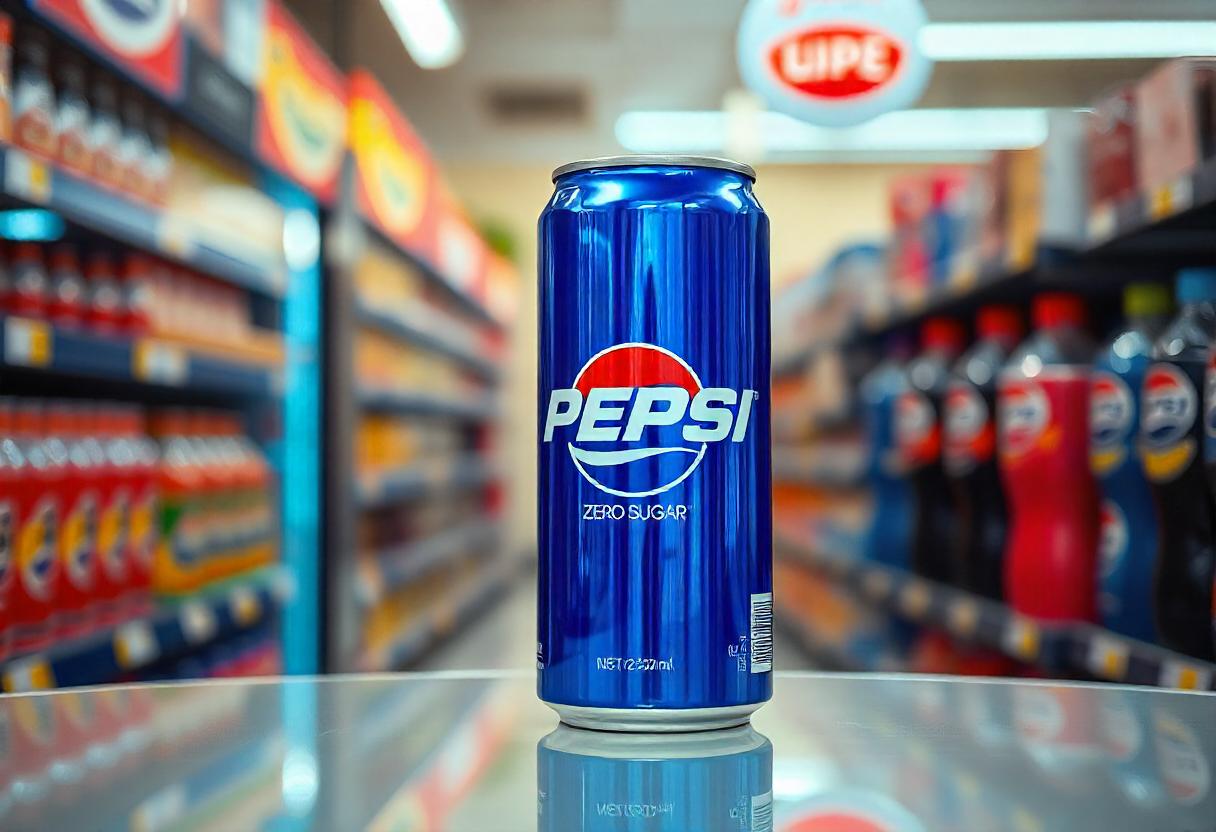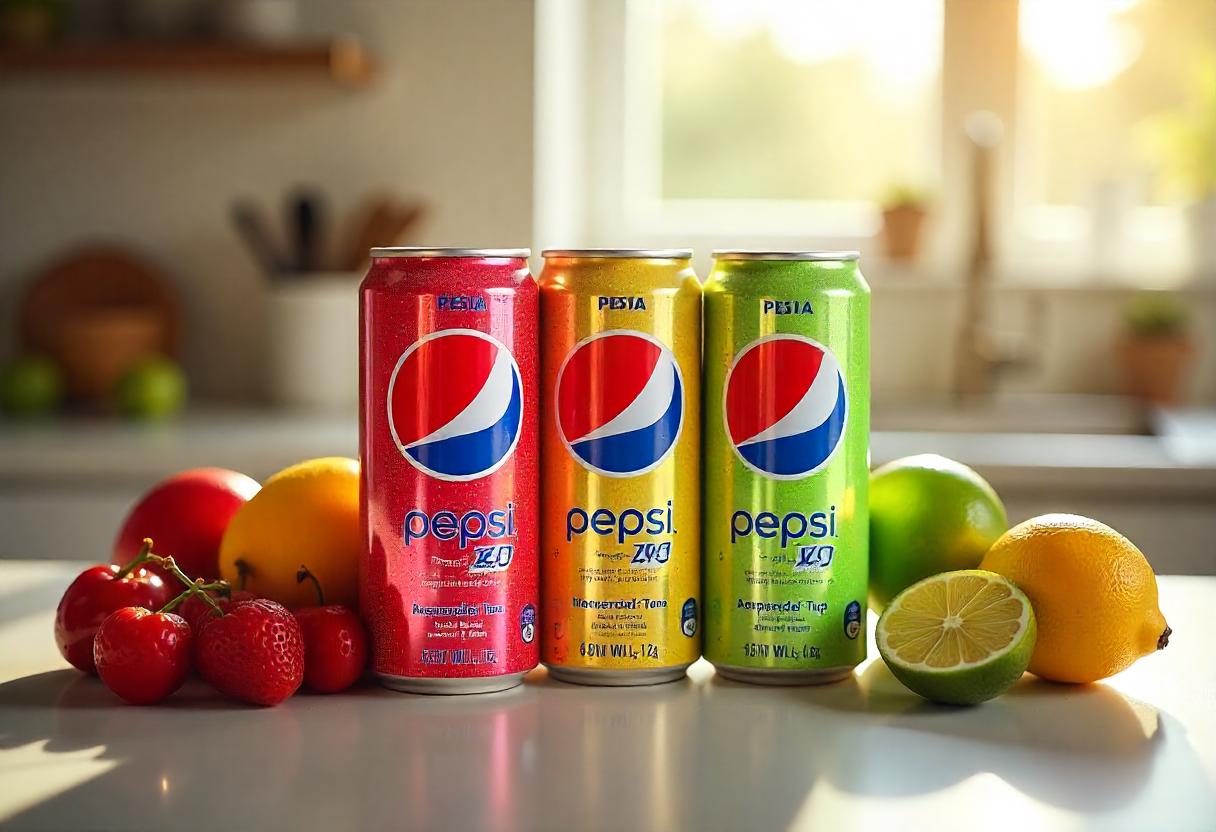In today’s health-conscious world, consumers are increasingly seeking ways to indulge their cravings without the adverse effects of added sugar. Pepsi Zero Sugar has emerged as a popular option, allowing fans to enjoy the classic cola flavor while adhering to their dietary goals. With a unique formulation, an array of flavors, and a commitment to sustainability, Pepsi Zero Sugar is appealing to those who prioritize both taste and health.
What is Pepsi Zero Sugar?

This zero-calorie, sugar-free soft drink offers a classic cola flavor without the guilt associated with regular sodas. Created to meet the increasing demand for healthier beverage options, it uses artificial sweeteners to deliver the same sweetness as sugar—without the added calories. Ideal for those looking to reduce their sugar intake, this drink provides the familiar cola taste in a lighter form, making it a popular choice among health-conscious consumers.
Differences Between Pepsi Zero Sugar, Diet Pepsi, and Regular Pepsi
Regular Pepsi contains a significant amount of sugar, leading to a calorie count of approximately 150 calories per 12 oz serving. This traditional formula offers a sweet and satisfying experience but at the expense of health-conscious choices.
Diet Pepsi, introduced as a calorie-free alternative, utilizes different artificial sweeteners and is known for its lighter taste, which some consumers find less appealing than regular Pepsi.
Pepsi Zero Sugar aims to bridge the gap between taste and health. Marketed as a full-flavored alternative, it is designed to closely mimic the taste profile of regular Pepsi, making it a favorite among those who want to avoid sugar without sacrificing flavor.
Health and Nutrition Facts
Nutritional Profile
It is celebrated for its nutritional profile, particularly for its zero calories and sugar content. Each serving typically contains:
- Calories: 0
- Sugar: 0 grams
- Caffeine: Approximately 69 mg per 12 oz serving
- Sodium: About 40 mg
- Total Carbohydrates: 0 grams
This impressive nutritional breakdown makes Zero-Calorie Beverage, an appealing choice for those monitoring their caloric intake or looking for sugar-free alternatives.
Health Considerations
When discussing, it is essential to address concerns regarding artificial sweeteners. Common sweeteners used in the formulation include aspartame and acesulfame potassium. Here’s a closer look at their health implications:
Aspartame: This low-calorie sweetener is about 200 times sweeter than sugar, allowing for minimal use in products. Some studies have raised concerns about potential links to various health issues, including headaches and allergic reactions; however, regulatory agencies like the FDA deem it safe for general consumption.
Acesulfame Potassium: Often used in conjunction with aspartame, this sweetener adds to the overall sweetness without adding calories. Some research suggests that it may alter gut microbiota, but more studies are needed to establish any significant health risks.
How Pepsi Zero Sugar Affects the Body
The impact of consuming a zero-calorie, sugar-free soda can vary from person to person. Each individual may experience different effects based on factors like metabolism, dietary habits, and overall health. While some people may find that it helps satisfy cravings without added calories or sugar, others might notice changes in taste preferences or energy levels over time. It’s always a good idea to consider how these beverages fit into a balanced diet and consult a healthcare provider for personalized guidance, especially for those with specific dietary needs or health concerns.
Potential Benefits
No Sugar Spikes: Without any added sugars, this beverage doesn’t lead to the rapid blood sugar spikes typically caused by sugary drinks. This makes it a more suitable choice for individuals managing diabetes or anyone monitoring their blood sugar levels.
Lower Caloric Intake: For those focused on weight management, swapping regular soda with this zero-calorie option can significantly reduce overall calorie intake. It lets consumers enjoy a fizzy drink without the added calories found in traditional sodas.
Hydration: While it contains caffeine, this soda can still contribute to daily hydration needs. However, it’s best enjoyed as a supplementary beverage, rather than replacing water as the primary source of hydration.
Drawbacks
However, some consumers may experience:
Cravings for Sweets: While Pepsi Zero Sugar can be satisfying, some people report that artificial sweeteners may trigger cravings for more sugary foods. This phenomenon, known as “hedonic hunger,” can lead to increased calorie consumption from other sources.
Does Pepsi Zero Sugar Raise Blood Sugar?: Studies suggest that it does not, as it contains no sugar or carbohydrates. However, individual responses may vary, and some people may still experience fluctuations in cravings.
Pepsi Zero Sugar vs. Other Pepsi Products
Pepsi Zero Sugar vs. Diet Pepsi
When comparing Pepsi Zero Sugar to Diet Pepsi, the primary differences lie in taste and ingredients. Many consumers prefer the taste of Pepsi Zero Sugar, claiming it offers a more robust flavor and resembles regular Pepsi more closely. The perception of a “real cola” taste in Pepsi Zero Sugar has attracted many traditional Pepsi drinkers looking for a low-calorie alternative.
Pepsi Zero Sugar vs. Pepsi Max
Pepsi Max, while also a low-calorie option, uses a different blend of sweeteners. Pepsi Max has a unique flavor profile, often described as bolder and less sweet than both Diet Pepsi and Pepsi Zero Sugar. While both products target health-conscious consumers, Pepsi Zero Sugar tends to appeal to those seeking a flavor that more closely resembles traditional cola.
Flavor Variants to Suit Every Taste

This zero-calorie soda offers a variety of flavors to cater to different taste preferences, making it a favorite among those seeking a sugar-free beverage with personality. Here are some popular choices:
Lime Twist: For a refreshing citrusy zing, the lime variant brings a burst of tang to the classic cola taste, adding a new level of refreshment.
Wild Cherry Fusion: Infused with a balanced cherry flavor, this option combines sweetness with a hint of tartness, creating a unique, fruity twist.
Bold Dark Cola: This richer, darker version of the classic drink provides a deep, satisfying taste, perfect for those who enjoy a more robust cola flavor.
Peach Splash: A summer favorite, the peach variant brings a hint of juicy sweetness, giving the traditional soda a fun, fruity vibe.
These options offer a range of flavors, allowing fans to enjoy a sugar-free cola experience tailored to their personal taste preferences.
Ingredients
Understanding the ingredients in Zero-Calorie Beverages can help consumers make informed choices. The key components typically include:
- Carbonated Water: The primary ingredient that provides the refreshing fizz.
- Caramel Color: Used to give Pepsi its characteristic dark color.
- Phosphoric Acid: Adds acidity and enhances flavor.
- Aspartame and Acesulfame Potassium: These artificial sweeteners create a sweet taste without adding calories.
- Caffeine: Provides a slight energy boost and enhances flavor.
The combination of these ingredients creates a refreshing beverage that is enjoyable without the guilt of added sugars.
The Science Behind Artificial Sweeteners
The development of it was fueled by advances in food science, particularly in the area of artificial sweeteners. These sweeteners can replicate the sweetness of sugar while eliminating calories. Here’s a closer look at the science behind them:
Taste Perception: Artificial sweeteners interact with the same taste receptors as sugar, providing a sweet sensation. However, some individuals may perceive differences in taste quality or aftertaste.
Caloric Impact: Since these sweeteners are much sweeter than sugar, only small amounts are needed to achieve the desired sweetness level, which significantly reduces caloric content.
Metabolic Effects: While some studies suggest artificial sweeteners may have minimal metabolic effects, others propose they could influence insulin sensitivity. Ongoing research is needed to clarify these potential impacts.
Caffeine Content
With around 69 mg of caffeine per 12 oz serving, It offers a moderate caffeine boost comparable to other soft drinks. For those concerned about caffeine intake, it’s worth noting that this amount is generally considered safe for most adults. However, moderation is key, especially for individuals sensitive to caffeine or those who consume multiple caffeinated beverages throughout the day.
History
The product was launched in response to changing consumer preferences and the growing demand for healthier beverage options. Its introduction marked a significant shift in PepsiCo‘s marketing strategy, prioritizing offerings for health-conscious consumers. Since its debut, the product has undergone various branding and flavor adjustments, reflecting ongoing consumer feedback and market trends. Today, its position in the market is strengthened by a commitment to flavor and quality, appealing to a wide audience.
Cultural Significance and Popularity
It has significantly impacted pop culture, bolstered by memorable advertising campaigns and sponsorships. The brand often collaborates with high-profile celebrities and athletes to engage younger consumers, creating a strong social media presence and trending hashtags.
Social Media Trends
It’s popularity is amplified on social media platforms, where consumers share their experiences and creative uses for the beverage. Engaging with influencers and creating shareable content have contributed to its rise among younger demographics.
Environmental Impact and Sustainability
PepsiCo is committed to sustainability, focusing on reducing its environmental footprint through various initiatives. This includes:
Recyclable Packaging: Efforts to ensure that all packaging is recyclable or made from recycled materials contribute to reducing plastic waste in the environment.
Sustainable Production Practices: PepsiCo is dedicated to minimizing water usage and energy consumption during production, supporting a more sustainable approach to beverage manufacturing.
Community Engagement: The company also invests in community programs aimed at promoting environmental awareness and sustainability education.
Such initiatives demonstrate PepsiCo’s commitment to environmental responsibility, aligning with the values of many consumers today.
Recipes and Creative Uses
It can also be used creatively in various recipes. Here are some innovative ideas:
Cocktails: Mix with spirits like vodka or rum for a refreshing cocktail. The versatility of flavors allows for unique combinations.
Marinades and Sauces: Use Zero-Calorie Beverage, in marinades for meats or as a base for barbecue sauces to add a touch of sweetness without the calories.
Frozen Treats: Create popsicles by mixing Zero-Calorie Beverage, with fruits or juices and freezing them for a refreshing summer treat.
Personal Experiences and Testimonials
Many consumers have shared their positive experiences with this Zero-Calorie Beverage, citing its taste and health benefits. Testimonials highlight how switching to this sugar-free beverage has helped individuals reduce their overall sugar intake without sacrificing flavor.
Where to Buy This Zero-Calorie Beverage Near You
Looking to stock up on this popular zero-calorie soda? Here’s where you can easily find it:
1. Local Grocery Stores
- Major Chains: Most large grocery stores, including Walmart, Target, Kroger, and Safeway, carry it in a variety of sizes and flavors. Check the beverage aisle for a wide selection.
- Convenience Stores: Places like 7-Eleven, CVS, and Walgreens often keep it in stock, making it convenient to grab on the go.
- Specialty Markets: Health-oriented stores like Whole Foods may carry it as well, although availability may vary.
2. Online Retailers
- Amazon: Purchase in bulk or as single orders on Amazon, where you can often find discounts and subscription options.
- Walmart & Target Online: Both retailers allow you to order online for either delivery or pickup at your local store.
- Official Brand Store: Check the brand’s official website for direct delivery options or use their store locator to find a nearby retailer.
3. Store Locator on the Brand’s Website
- Store Locator Tool: Use the brand’s store locator tool by entering your zip code to find the nearest retailers with it in stock. This tool provides up-to-date information on availability.
4. Delivery Services
- Instacart & Shipt: Order from local grocery stores and have it delivered to your home with services like Instacart or Shipt.
- Uber Eats & DoorDash: Many convenience stores partnered with these services may offer it for same-day delivery.
5. Wholesale Clubs
- Costco & Sam’s Club: These wholesale stores typically offer larger packs, making it easy to stock up. Check online or in-store for availability.
Summary
It is more than just a sugar-free soft drink; it embodies the intersection of taste, health, and consumer preferences in the modern beverage market. With its carefully crafted formula, diverse flavor options, and commitment to sustainability, it continues to attract health-conscious consumers seeking to enjoy the classic cola flavor without compromising their dietary goals.
As we navigate the complex landscape of nutrition and taste, products like Zero Sugar represent a viable solution for those looking to indulge responsibly. By staying informed about ingredients and potential health implications, consumers can make choices that align with their health goals while enjoying the flavors they love.
Frequently Asked Questions (FAQs)
It is a low-calorie, sugar-free alternative to regular soda, making it a healthier option for those watching their sugar intake. However, moderation is essential, as it contains artificial sweeteners.
Yes, It contains approximately 69 mg of caffeine per 12 oz serving, similar to other colas.
Absolutely! It can be used in various recipes, from marinades to desserts, adding a unique flavor without extra calories.
While generally considered safe, some individuals may experience digestive discomfort or cravings for sweets due to artificial sweeteners. It’s always best to consume in moderation.
It is widely available in grocery stores, convenience stores, and online retailers. Check local listings for availability in your area.
Zero Sugar is designed to taste more like regular Pepsi, while Diet Pepsi has a different flavor profile. Many consumers prefer the taste of Zero Sugar over Diet Pepsi.
Discover Your Favorite Flavor of Zero Sugar!
If you haven’t tried It yet, now is the perfect time! Explore the different flavors and find your favorite. Share your experiences, favorite recipes, or unique ways you enjoy Zero Sugar in the comments below!



